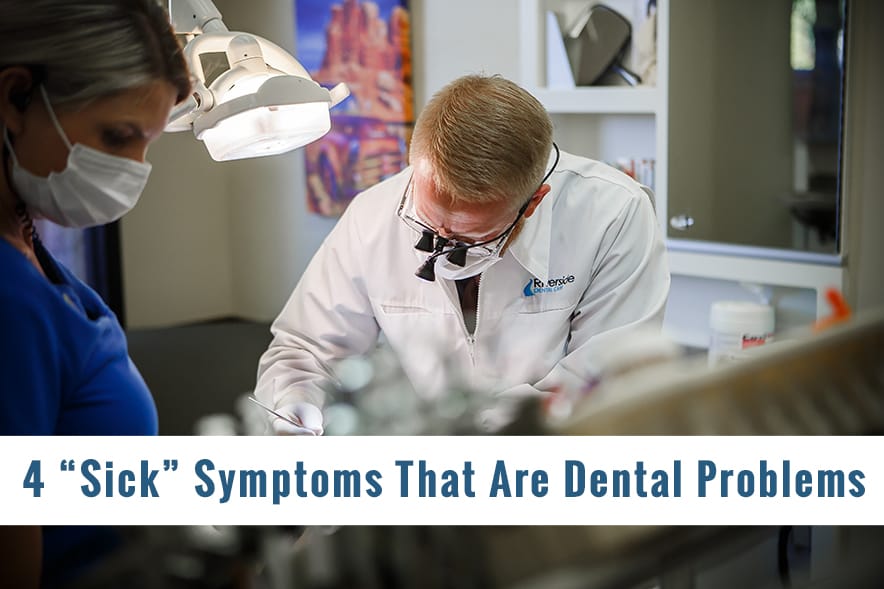
Sometimes, people call to reschedule their appointment with us here at Riverside Dental Care because they are feeling sick. In cases of viral and bacterial infections—especially with COVID-19 concerns—pushing your appointment back is best. However, there are times when your symptoms of sickness are actually caused by dental issues
To help you identify the difference between being infectiously ill and having dental-related sick symptoms, here are four of the most misunderstood signs that you have a dental problem.
- Swollen Throat, Influenza Feelings: Potential Abscess
- Ongoing Headache: Potential Cavity
- Fever, Chills, Bleeding Gum: Potential Periodontal Disease
- Runny Nose And Fever: Potential Upper Dental Issue
1. Swollen Throat, Influenza Feelings: Potential Dental Abscess
Usually, a dental abscess form when bacteria are able to enter the pulp of your tooth and the infection creates a pocket of fluid in your gums. As you might expect, dental abscesses are painful, as it causes swelling in your gums. This swelling can extend to your throat and trigger common influenza feelings, such as headaches, runny nose, or congestion.
It is essential that you get a dental abscess treated as soon as possible. An untreated abscess can lead to tooth loss, jawbone density loss, and in some severe cases, death. Our dentists can drain your dental abscess and provide you with treatment options to address the source of the infection.
2. Ongoing Headache: Potential Cavity
Now, we aren’t saying that our dental services are the cure for all headaches. However, you would be surprised how many individuals experience headaches as symptoms of their cavities.
Each of your teeth has nerves, and when a cavity develops, those nerves receive more input from simple things like talking, chewing, drinking, etc. This increased pressure and input on your teeth’s nerves can be painful and translate into nagging, ongoing headaches.
Even one cavity can trigger headaches. So, if you can’t identify other environmental factors that may be causing your headaches, and it’s about time for your biannual checkup, you may want to come in a bit early to have our staff screen you for cavities.
3. Fever, Chills, Bleeding Gums: Potential Periodontal Disease
As we mentioned when discussing dental abscesses, oral infections can present with flu-like symptoms. This holds true when you experience periodontal disease, also called gum disease.
In the early stage of gum disease—called gingivitis—signs such as bleeding gums and slight gum recession are ignored. However, if not addressed in the early stages, it is possible to experience swollen gums that are constantly tender, chills, fever, and a runny nose.
It is best to address periodontal disease as soon as possible. For one thing, the early intervention steps aren’t as invasive as later gum disease intervention, and in the later stages, some of the effects are irreversible.
4. Sinus Infections: Potential Upper Dental Issue
Sinus infections can have a number of sources, but the one you may not have considered is an issue with your upper jaw, particularly around your front upper teeth. An infection in the tissue in this area can trigger sinus issues, from continually runny noses to chronic sinus infections.
Correcting your dental-related sinus infection can be as simple as having infected cavities addressed. In some cases, a dental implant may need to be adjusted, as the pressure is causing issues in your sinuses.
If you are struggling with some of these issues and need to get your oral health checked, feel free to contact us today to set up an appointment.



Leave a Reply